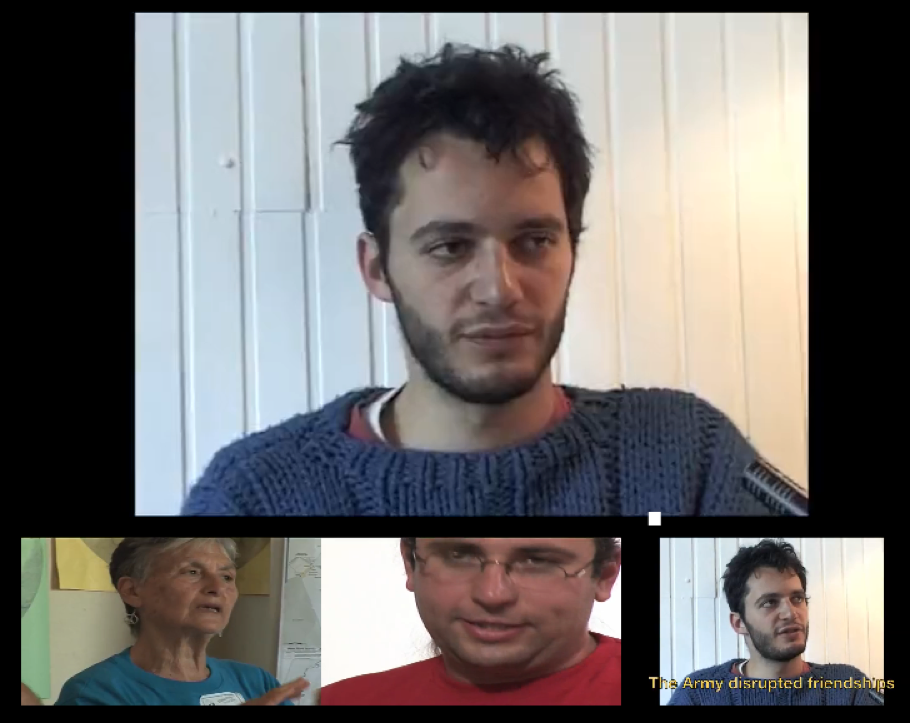The Only Democracy? » Featured, Human Rights Activists in the Crosshairs » Wife and Nine Children of Bil’in Political Prisoner: Life Without Adeeb
Wife and Nine Children of Bil’in Political Prisoner: Life Without Adeeb
Adeeb Abu Rahma, a taxi driver from the West Bank Village of Bil’in, is known for his firm committment to nonviolence during the weekly demonstrations against the Wall. At the July 10, 2009 demonstration, he was grabbed by Israeli soldiers as he walked away from them, his message of resistance on a sign he held. He has been imprisoned ever since, without trial. Adeeb is the sole provider for his nine children, wife and mother.
Bil’in Village reports on an interview with Adeeb’s wife, Fatma Abu Rahma:
Fatma Abu Rahma and five of her nine children have gathered in the living room of the family’s prospective son in law. The house is fully equipped, but its sterile immaculateness divulges its lack of inhabitants. Doha, who is nineteen, will move in once she is married, but has been postponing her marriage until the release of her father Adeeb. Fatma’s tiredness, frustration and despair read from her eyes and are confirmed in her muttering speech, calling on Allah to help her family. She repeatedly exclaims that she lacks information on her husband’s current state of being, which cause her grave irritation and concern.
My husband has been away from me and my family for almost nine months. On July 10th 2009 Adeeb attended the weekly demonstration in Bil’in, on this day soldiers grabbed and arrested him. He was officially charged with incitement to violence. The truth is that he is arrested for nothing more than taking part in a popular demonstration against land theft committed by Israel. Adeeb encouraged others to join the protests, while Israel clearly wants to annihilate the popular resistance. He is imprisoned for defending his people’s rights.
I am grief-stricken since Adeeb’s imprisonment. However, I cannot allow myself to lament my husband’s loss as I have a family of nine to take care of. Since Adeeb has been away, I have to be both mother and father to my children. We shared the care over the children, this is now my sole responsibility. We miss him very much.
Batuh, the youngest daughter, has caught on the topic of the conversation, stops playing, and stresses the tension by softly, but firmly addressing her mother: “I want to go with you, to see ‘baba’!”
We have only been allowed one visit since Adeeb’s arrest. Batuh was there to see her father, but she was afraid of the pale and sad figure that her lively father had turned into. She did not even recognize Adeeb and refused to talk to him. Since this visit, no one from the family has been allowed to visit. We are all considered to be “security threats”. Generally, prisoners are entitled to two visits every month. We are not allowed to send him a letter or call him. Even his lawyer has only been allowed one visit. The little information we have on Adeeb, we gather through prisoners who have been released. Apparently, my husband was hospitalized for four days recently, but nobody told us!
The living conditions in Ofer prison are said to be extremely harsh. During his first days of detention, Adeeb was beaten severely by his guards. He had been drenched by the stinking chemical water that the army used during the demonstration. The prison administration would not provide fresh clothing, so fellow prisoners gave him another outfit. Four months after his arrest, I took three of our daughters to visit Adeeb in prison and bring clean clothing. We were not allowed to give him his trousers, supposedly because he had not demanded them on the prison’s official request form! Clearly, that is a lie.
Alaah, 17 years old, was particularly moved by the visit: “My father looked very sad and tired. I felt such desperation this day. We were so close, but kept apart by a glass barrier in the prison’s visiting area. I wanted to sit next to him and touch him.”
Together with ten other prisoners, my husband spends day and night in a prison cell of less than 15 square metres, which includes the bathroom. Sunlight is limited in this cramped cell. A tiny bathroom window and small openings in the ceiling are the only sources of daylight. Adeeb can only escape this cage and grasp a sense of the real world during a daily ten-minute walk outside.
Financially, it has been really difficult on us. Adeeb used to work as a taxi driver, so our family suffers from this loss of income. We still have a little shop, opened by two of my children, but it does not cover my family’s necessary expenses. Our two eldest daughters are in university, which is very expensive.
It has been even harder on an emotional level. Two months ago, Alaah, my daughter of 17, was very sick and was even hopsitalized twice. She could not walk or move, as if she was paralyzed. The doctors could not find anything wrong with her and decided it was psychosomatic…
Adeeb has had 15 court hearings so far. His case has been remanded until the end of legal proceedings, which may take up to a year or longer. Basically, we do not know when he will be back home.
Postscript: the family was allowed one visit on March 17, shortly after this interview.
Video of Bil’in July 10th 2009 demonstration shows Adeeb (in orange shirt) leading demonstration and then being dragged away by Israeli soldiers; he has been imprisoned without trial ever since
Filed under: Featured, Human Rights Activists in the Crosshairs · Tags: Bi'lin, Protests Against the Wall









 “You have a choice! Israeli Anti-Militarists Speak”
“You have a choice! Israeli Anti-Militarists Speak”